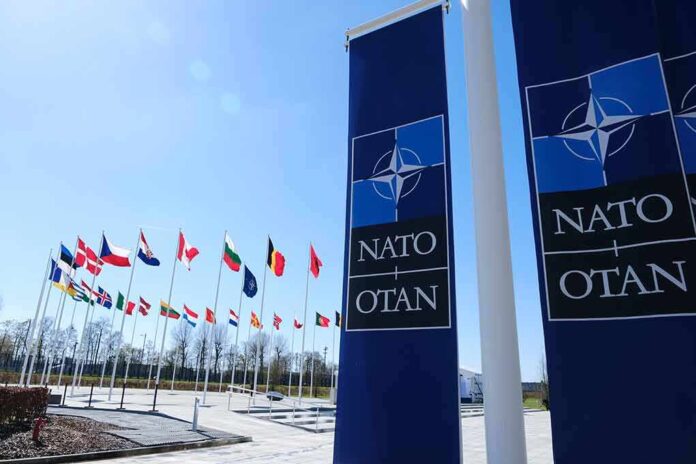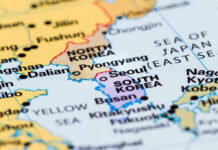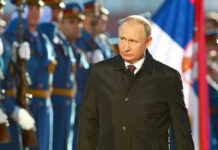President Biden authorizes Ukraine to use long-range missiles against Russia, prompting NATO allies to bolster military support.
At a Glance
- Biden lifts restrictions on U.S.-supplied ATACMs missiles, allowing Ukraine to strike deeper into Russia
- NATO members, particularly the U.K. and France, prepare to send more weapons to Ukraine
- Russia deploys North Korean troops to reinforce its war efforts in Ukraine
- Germany maintains its stance against providing long-range missiles to Ukraine
- Tensions escalate as Russia criticizes increased U.S. involvement in the conflict
Biden’s Decision Shifts NATO Support
In a significant policy shift, President Joe Biden has authorized Ukraine to use U.S.-supplied Army Tactical Missile Systems (ATACMs) to strike deeper inside Russia. This decision, announced on November 17, lifts previous restrictions and marks a turning point in NATO’s military support for Ukraine. The move comes as Russia continues its aggressive campaign, launching significant drone and missile attacks on Ukrainian energy infrastructure and civilians.
The decision to allow long-range missile strikes within Russian borders was influenced by Russia’s deployment of 50,000 troops to the southern region of Kursk, near Ukraine’s northern border. This escalation has prompted NATO allies, particularly the United Kingdom and France, to prepare additional military support packages for Ukraine.
NATO Allies Respond
Following Biden’s announcement, key NATO members have stepped up their commitments to Ukraine’s defense. The United Kingdom and France are assembling military packages that include Storm Shadow missiles, which have a range of 500 kilometers and carry 450 kg warheads. These advanced weapons systems significantly enhance Ukraine’s ability to target Russian military assets and infrastructure deeper behind enemy lines.
“Russia is the only power that made an escalatory decision … it’s really this break that led to the U.S. decision” – Source
French President Emmanuel Macron’s statement highlights the NATO alliance’s perspective that Russia’s actions have necessitated this increased support. The new policy also allows missiles made with U.S. technology in France and the U.K. to be used by Ukraine within Russian borders, previously requiring U.S. authorization for such deployments.
Russian Response and Escalation
The Kremlin has reacted strongly to NATO’s increased support for Ukraine. Russian government spokesperson Dmitry Peskov criticized the decision, describing it as “a qualitatively new situation in terms of the involvement of the United States in this conflict.” This statement underscores Russia’s view of the escalating Western involvement in the Ukraine conflict.
“Strikes are not made with words. Such things are not announced. The missiles will speak for themselves.” – Source
Ukrainian President Volodymyr Zelenskyy’s statement reflects Ukraine’s determination to utilize these new capabilities effectively. The provision of long-range missiles has been a long-standing request from Ukraine, aimed at countering Russia’s attacks on Ukrainian cities and infrastructure. However, the deployment of North Korean troops and munitions by Russia to reinforce its war efforts adds another layer of complexity to the conflict.
International Concerns and German Stance
As the conflict intensifies, international bodies have expressed concern over the escalation. U.N. Secretary-General Antonio Guterres emphasized the need to avoid further escalation, stating, “We want peace, we want fair peace.” This sentiment reflects the growing international unease about the potential for a wider conflict.
Amidst the increased NATO support, Germany stands out for its continued reluctance to provide long-range missiles to Ukraine. A spokesperson for the German government stated, “There are certain limits for the chancellor (Olaf Scholz),” indicating Germany’s more cautious approach to military aid. This position highlights the varying degrees of resolve among NATO countries in their support for Ukraine.
As the conflict enters this new phase, the international community watches closely. The provision of long-range missiles to Ukraine represents a significant escalation in NATO’s support, potentially altering the dynamics of the war. While aimed at defending Ukraine’s sovereignty, these actions also raise concerns about the potential for a broader conflict involving NATO and Russia.
Sources:
- Ukraine has been waiting to strike deep into Russia. Is Biden’s approval too late?
- NATO Members Prepare More Weapons for Ukraine After Biden Missile All-Clear











